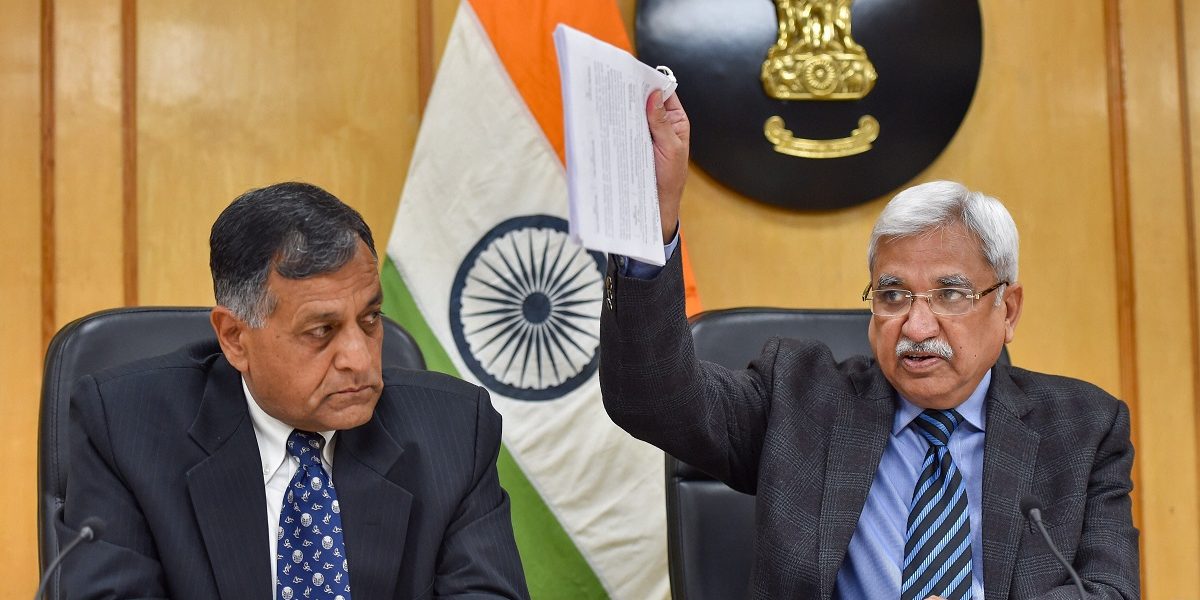Delhi Assembly elections will be held on February 8 and counting on February 11
 NEW DELHI : The voting for assembly polls in Delhi will be held on February 8, while the counting of votes will be held on February 11, the Election Commission has announced.
NEW DELHI : The voting for assembly polls in Delhi will be held on February 8, while the counting of votes will be held on February 11, the Election Commission has announced.
Voting will be held across 13,750 polling stations and the Model Code of Conduct is effective immediately, Chief Election Commissioner Sunil Arora said. The term of the 70-member Delhi Assembly is ending on February 22 and a new House has to be constituted before that.
Chief Election Commissioner Sunil Arora said today. Addressing reporters Mr Arora said the Election Commission (EC) was committed to “fair polls” and said 13,000 polling stations would be set up and nearly 90,000 officials would be deployed to ensure everything goes smoothly.
The EC also confirmed that the model code of conduct was in force with immediate effect. The poll body also reminded the government that no state-specific schemes could be announced during the Budget speech on February 1
1.46 Crore Eligible Voters In Upcoming Delhi Assembly Elections
The controversial citizenship law is also likely to feature prominently, particularly since Mr Kejriwal has joined a long list of non-BJP state leaders and politicians who have voiced opposition to it and programmes like the NRC and NPR.
The AAP launched its campaign last month, with Deputy Chief Minister Manish Sisodia saying he was confident of success. The party also revealed its slogan – ‘Ache beete 5 saal, lage raho Kejriwal (Past 5 years have been good, keep going with Kejriwal’).
The contentious National Register of Citizens (NRC), Citizenship Amendment Act, air pollution, women’s safety, and statehood demand for Delhi likely to dominate the election narrative.
The battle for the Capital is a prestige war for Chief Minister Arvind Kejriwal’s ruling Aam Aadmi Party (AAP), which is seeking re-election after a thumping victory in 2015 when the party won 67 of 70 seats in the Assembly.
Kejriwal, who has sought to keep the focus of the electoral battle on his government’s development works such as the Mohalla clinics and model schools, had earlier said his party was eyeing all 70 seats. Taking a cue from Mamata Banerjee in West Bengal, Kejriwal also roped in election strategist Prashant Kishor’s political consultancy firm I-PAC in his quest to return as Delhi chief minister for the second consecutive term next year, though the firm has had too short a period to deliver.
Soon after the announcement of the dates, AAP’s Raghav Chadha said his party was geared up for the polls which would be fought on local issues. So far as the BJP is concerned, the party also launched its campaign last month with star campaigner Prime Minister Narendra Modi leading a rally at the Ramlila Maidan. Modi used the occasion to target opposition parties over the nationwide protests against the citizenship law.
Keeping the option open for projecting a CM face against Kejriwal in Delhi, BJP President and Union Home Minister Amit Shah had said the saffron party has emerged as an alternative in the national capital given people’s growing disenchantment with the Aam Aadmi Party government.
Congress’s Delhi unit chief Subhash Chopra claimed the Congress will win a “clear majority” in the election to the 70 assembly seats.
The Delhi Congress has set up an election “war room” at the party office on DDU Marg. The war room, comprising 14 workstations manned by 30 volunteers, will provide logistic support to party candidates in the election.
This will also be the first polls in the national capital since the BJP swept to a massive win in Lok Sabha polls early last year; the party won all 7 parliamentary seats in Delhi. Chief Minister Kejriwal’s AAP is seeking re-election after recording a massive win in 2015; the AAP won 67 of 70 seats, with the remaining three going to the BJP and the Congress drawing a blank. The party had previously been in power for 15 years between 1998 and 2013.
In the 2015 polls the AAP emerged with 54.3 per cent of the vote share. The BJP was second with 32.3 per cent and the Congress trailed with a poor 9.7 per cent.

